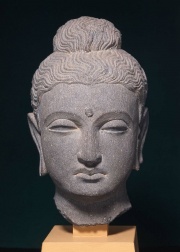Schist
Jump to navigation
Jump to search
Description
A group of medium-grain, metamorphic rocks that have parallel layers of lamellar minerals, such as mica, chlorite, talc, hornblende, and graphite. Quartz is often present as a secondary mineral. Schists are formed at high temperatures from shale, clay, or mud. They cleave easily along the foliated planes. Schists are usually named for their predominant mineral constituent, such as mica schist, hornblende schist, chlorite schist, and talc schist. The exception occurs when a schist is named for an unusual mineral constituent such as garnet schist, tourmaline schist, and glaucophane schist.
Synonyms and Related Terms
siltstone; greywacke; esquisto (Esp.); schiste (Fr.); xisto (Port.); Schiefer (Deut.); schist (Ned.)
Sources Checked for Data in Record
- Anne Grimmer, Glossary of Building Stone Terms, A Glossary of Historic Masonry Deterioration Problems and Preservation Treatments, National Park Service, Washington DC, 1984
- Van Nostrand's Scientific Encyclopedia, Douglas M. Considine (ed.), Van Nostrand Reinhold, New York, 1976
- Random House, Webster's Encyclopedic Unabridged Dictionary of the English Language, Grammercy Book, New York, 1997
- R.F.Symmes, T.T.Harding, Paul Taylor, Rocks, Fossils and Gems, DK Publishing, Inc., New York City, 1997
- The American Heritage Dictionary or Encarta, via Microsoft Bookshelf 98, Microsoft Corp., 1998

